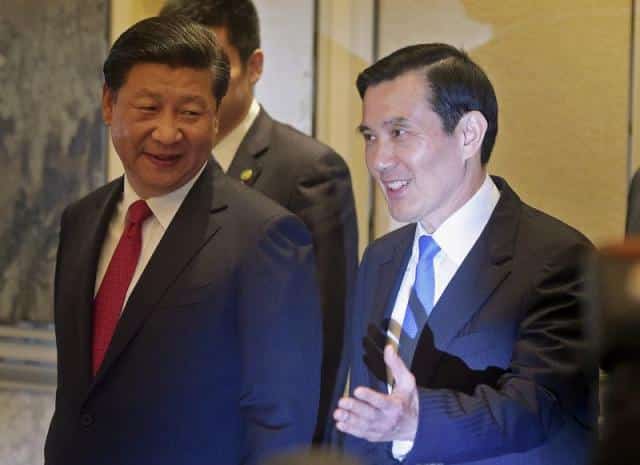News
China’s Xi Hosts Former Taiwan President In Beijing, In Rare Meeting Echoing Bygone Era Of Warmer Ties

On Wednesday, Chinese President Xi Jinping met with a former Taiwanese president who advocates stronger ties with China. This was a very uncommon encounter just weeks before the democratic island swears in a new leader whom Beijing openly despises.
According to state broadcaster CCTV, Ma Ying-jeou, Taiwan’s president from 2008 to 2016, met with Xi on Wednesday afternoon while on an 11-day tour of China.
China’s Xi Hosts Former Taiwan President In Beijing, In Rare Meeting Echoing Bygone Era Of Warmer Ties
The carefully choreographed moment is rich in political symbolism: it marks the first time China’s top leader in Beijing has hosted a former Taiwanese president since Chiang Kai-shek’s Kuomintang (KMT) retreated to Taipei in 1949.
This is Xi’s first meeting with former KMT leader Ma since their historic summit in Singapore in 2015.
However, their reunion illustrates the expanding political split across the Taiwan Strait and how Xi’s increasingly hostile posture toward Taipei has driven more Taiwanese away from China.
In his opening remarks, Xi thanked Ma for opposing “Taiwan independence,” encouraging cross-strait relations, and recognizing that both sides of the strait belong to “one China.”
“Compatriots on both sides of the Taiwan Strait are all Chinese. “There is no grudge that cannot be settled, no issue that cannot be debated, and no force that can separate us,” Xi told his visitor. “External interference cannot stop the historic trend of the reunion of the family and the country.”
Ma responded by stating that while the two sides of the strait grew under different regimes, the people on both sides were Chinese.
“If a war breaks out between the two sides of the Taiwan Strait, it will be an unbearable burden for the Chinese nation,” he added. “I sincerely hope that both sides respect the values and way of life treasured by the people and maintain peace across the strait.”
However, as Xi increases military, economic, and diplomatic pressure on its democratic island neighbor, the appeal of a shared Chinese identity has declined significantly in Taiwan.
That tendency was highlighted in January when Taiwanese voters ignored China’s warnings and gave the ruling Democratic Progressive Party (DPP) an unprecedented third term by electing Lai Ching-te, who has long faced Beijing’s anger for defending Taiwan’s sovereignty.
Since then, Beijing has snatched another of Taipei’s dwindling diplomatic allies, increased patrols around Taiwan’s frontline islands after two Chinese fishermen perished in neighboring waters, and continues to fly fighter jets near the self-ruled island.
Ma’s encounter with Xi comes during a busy week of diplomatic action in Washington. President Joe Biden will host the first-ever leaders’ summit involving the United States, Japan, and the Philippines. Joint fears about China’s growing assertiveness under Xi, notably toward Taiwan, are a primary motivation for the summit.
A senior source in Taiwan’s administration informed CNN. Beijing rescheduled the meeting from Monday to coincide with Biden’s summit with Japanese Prime Minister Fumio Kishida on Wednesday.
According to Amanda Hsiao, senior China analyst at the International Crisis Group, China’s pressure methods are meant to drive Taiwan’s next Lai administration into a more accommodating political attitude toward China.
“Ma’s visit continues this effort by underscoring Beijing’s position that cross-strait dialogue is only possible with those in Taiwan who accept the idea that the two sides of the strait belong to ‘one China,'” she said.
Beijing has severed high-level official contacts with Taipei since President Tsai Ing-wen of the DPP took office in 2016. A wave of outrage over Ma’s contentious trade agreement with Beijing served as the impetus for this action, which took advantage of the growing number of Taiwanese voters determined to preserve the island’s unique identity.
Unlike the KMT, the DPP rejects Beijing’s prerequisite for official talks, an agreement in which both sides accept “one China,” albeit with different views.
Official communication is unlikely to restart for Lai, who has pledged to uphold Tsai’s cross-strait policies. Beijing has consistently rejected Lai’s offer of negotiations, describing him as a dangerous separatist and “troublemaker.”
However, by focusing on Ma, who has been out of office for years and has little power to shape Taiwan’s political reality, Beijing may be revealing “its inability to find or cultivate another Taiwanese political figure of comparable stature who is willing to play dove toward Beijing today,” said Wen-Ti Sung, a Taiwan-based fellow with the Atlantic Council’s Global China Hub.
Ma is becoming a frequent flyer to the Chinese mainland.
China’s Xi Hosts Former Taiwan President In Beijing, In Rare Meeting Echoing Bygone Era Of Warmer Ties
The 73-year-old became Taiwan’s first former president to visit the mainland in late March last year, embarking on a 12-day journey across the Taiwan Strait. However, he was unable to gain a meeting with any member of Beijing’s Politburo Standing Committee, the country’s most powerful body.
This year’s visit, like the previous one, coincided with the Qingming Festival when people pay tribute to deceased family members and worship their ancestors; it also occurred just weeks before Lai’s inauguration as Taiwan’s president on May 20.
He said, “A meeting at this juncture enables Beijing to highlight the shared cultural roots between Taiwan and China and to exert pressure on Taiwan’s next administration.”
“Beijing is using the meeting between Xi and Ma to highlight the credibility and longevity of its carrots – that Beijing is good to its allies, whether incumbent or retired. It sends a message to political leaders around the world that embracing Beijing is a wise long-term investment.”
China’s welcoming of Ma’s visit signals Taiwan and others that peaceful unification by winning hearts and minds remains Beijing’s favored choice, at least for the time being, despite simmering cross-strait tensions, Sung noted.
Carefully edited footage of the talks, which is likely to reach millions of households in China via prime-time television news, sends a message to the Chinese public that unification with Taiwan is still feasible despite the DPP’s historic election triumph.
“For Beijing, Ma’s visit is also a useful way of assuring its domestic audience – ‘We have not lost the hearts and minds of the Taiwanese people, there remains cultural and historical connections that bind us, and the DPP does not represent mainstream Taiwanese views,'” Hsiao, the analyst, said.
Ma’s agenda, including his meeting with Xi, has been widely observed in Taiwan.
“The ruling party DPP will likely play down the significance of Ma’s China visits, preferring to describe it as the private act of tourism by a retiree,” Sung, a member of the Atlantic Council, said.
China’s Xi Hosts Former Taiwan President In Beijing, In Rare Meeting Echoing Bygone Era Of Warmer Ties
“Taiwan’s opposition KMT will be torn – it wishes to celebrate Ma’s achievements with Beijing, but is also hesitant to flaunt it in the face of the Taiwanese electorate, which remains wary about closer cross-strait ties.”
Ma remains a senior member of the KMT, which won the most seats in Taiwan’s parliamentary elections in January but failed to win the presidency for the third time.
The KMT, Taiwan’s largest opposition party, is eager to demonstrate that it is capable of handling relations with both China and the United States, but James Chen, an assistant professor of diplomacy and international relations at Tamkang University, says Ma’s meeting may do more harm than good.
“The DPP and its supporters have questioned Ma’s loyalty at home and labeled the KMT as pro-China.” “Washington, particularly Capitol Hill, may not appreciate Ma’s trip to China due to bipartisan anti-China sentiment,” he stated.
Few experts expect the conference will significantly alter the status quo in cross-strait ties.
“The value of this meeting is primarily in its symbolism – an attempt to shape the cross-strait narrative to both parties’ favor while fundamental political differences remain,” said Hsiao of the International Crisis Group.
However, regardless of the summit’s outcome, Ma believes it will cement his legacy on cross-strait policy.
“He likely wishes to be remembered as the sole Taiwanese leader who can break the ice with Beijing,” he said.
SOURCE – (CNN)
News
Britain Must Be Ready for War in 3 Years, Warns New Army Chief

The new head of the Army has stated that Britain must be prepared to fight a war within three years.
Gen Sir Roland Walker has issued a warning about a variety of risks in what he calls a “increasingly volatile” environment.
However, he stated that war was not inevitable and that the Army had “just enough time” to prepare to prevent conflict.
He stated that the Army’s fighting capacity would be doubled by 2027 and tripled by the end of the decade.
Gen Walker warned that the Britain was under threat from a “axis of upheaval” in his first speech as Prime Minister on Tuesday.
Among the primary concerns confronting the Britain in the next years, as noted by the general in a briefing, is an enraged Russia, which may seek vengeance on the West for helping Ukraine, regardless of who wins the war.
He stated: “It doesn’t matter how it finishes. I believe Russia will emerge from it weaker objectively – or completely – but still very, very dangerous and seeking some form of retaliation for what we have done to assist Ukraine.”
Britain’s Government Defence Review and Military Challenges
He also warned that China was determined to retake Taiwan, and Iran was likely to seek nuclear weapons.
He stated that the threats they posed may become particularly acute in the next three years, and that these countries had formed a “mutual transactional relationship” since the war in Ukraine, sharing weaponry and technology.
However, he stated that the path to conflict was not “inexorable” if the UK re-established credible land troops to assist its deterrent strategy for avoiding war.
In his speech, he described his force of slightly over 70,000 regular troops as a “medium-sized army” and made no direct call for additional resources or men.
However, he pushed the British Army to adapt swiftly, focussing on technology such as artificial intelligence and weaponry rather than numbers.
His ultimate goal is for the Army to be capable of destroying an opponent three times its size.
This would entail firing quicker and farther, he said, aided by lessons learnt from the Ukraine war.
The general’s speech at the Royal United Services Institute land warfare conference comes only one week after the government began a “root and branch” defence review to “take a fresh look” at the challenges facing the armed services.
Defence Secretary John Healey launched the assessment, describing the existing status of the armed forces as “hollowed-out” and stating that “procurement waste and neglected morale cannot continue”.
According to the most recent Ministry of Defence (MoD) numbers from April 2024, the Britain’s regular Army forces total 75,325 troops (excluding Gurkhas and volunteers).
That figure has been declining in recent years, as recruiting has failed to match retention. The previous Conservative administration lowered the planned headcount from 82,000 to 72,500 by 2025.
Members of the NATO military alliance have agreed to spend at least 2% of GDP on defence by 2024, but several countries are unlikely to fulfil this goal.
The Britain presently spends 2.3% of its GDP on defence. Prime Minister Sir Keir Starmer has previously stated that the defence review will include a “roadmap” for increasing this to 2.5%, however he has yet to provide a date for this promise.
Source: BBC
News
Katie Ledecky Hopes For Clean Races At Paris Olympics In The Aftermath Of The Chinese Doping Scandal

PARIS — Katie Ledecky is looking for clean Olympic races. On Wednesday, Hope had pretty much reached her limit.
The American swimmer hopes to add to her six gold medals as she competes in the 400, 800, and 1,500 meters at the Paris Games. Her program starts with the heavy 400 on Saturday, featuring Ariarne Titmus and Summer McIntosh.

Katie Ledecky | ESPN Image
Katie Ledecky Hopes For Clean Races At Paris Olympics In The Aftermath Of The Chinese Doping Scandal
The 27-year-old Katie is competing in her fourth Summer Olympics, but the first since a doping scandal involving almost two dozen Chinese swimmers who tested positive for a banned chemical before the Tokyo Games — yet were permitted to compete with no consequences. The controversy has raised serious worries regarding the effectiveness of anti-doping initiatives.

Katie Ledecky | Vogue Image
“I hope everyone here is going to be competing clean this week,” Ledecky claimed. “But what truly counts is, were they training cleanly? Hopefully this has been the case. Hopefully, there has been worldwide testing.”
The International Olympic Committee has expressed concern over the ongoing US investigation into possible doping by Chinese swimmers. While awarding the 2034 Winter Olympics to Salt Lake City on Wednesday, the IOC urged Utah officials to do whatever they could to stop the FBI investigation.
“I think everyone’s heard what the athletes think,” Katie added. “They seek transparency. They want more answers to the remaining questions. At this point, we are here to race. We are going to race whoever is in the lane next to us.
“We are not paid to conduct the tests, so we trust those who follow their regulations. That applies both today and in the future.

Katie Ledecky | ESPN Image
Katie Ledecky Hopes For Clean Races At Paris Olympics In The Aftermath Of The Chinese Doping Scandal
SOURCE | AP
News
London Heatwave Alert: High Temperatures Set to Soar to 29C Next Week

As the summer holidays begin, London may experience an official heatwave with temperatures reaching up to 29 degrees Celsius.
The Met Office predicts a long period of sunny and dry weather for London after a soggy spring and summer.
After a cloudy day on Saturday, temperatures are expected to reach 27C on Sunday, with lots of sunlight.
On Monday and Tuesday, temperatures are forecast to peak at 29 degrees Celsius. Monday is forecast to offer more sunlight, while Tuesday may see some gloomy weather.
Temperatures are expected to remain in the high 20s next week, with lows of approximately 18C.
According to the Met Office, a heatwave is “an extended period of hot weather relative to the expected conditions of the area at that time of year, which may be accompanied by high humidity.”
In the United Kingdom, a heatwave is proclaimed when daily temperatures meet or surpass a certain level for at least three consecutive days.
In London, the heatwave threshold is 28 degrees Celsius.
The Met Office reported that the UK is experiencing hotter and wetter weather on average due to climate change.
The UK experienced its warmest May and April on record this year, despite damp and dismal conditions in many areas.
According to the Met Office’s State Of The UK Climate 2023 report published on Thursday, the UK experienced historic levels of extreme weather last year.
In the United Kingdom, 2023 was the second warmest year on record, bringing storms, flooding, strong heatwaves, and rising sea levels; only 2022 was warmer.
It was 0.8°C higher than the average from 1991 to 2020, and 1.66°C higher than the 1961 to 1990 average.
However, 2023 will be a “cool year” in comparison to 2100, based on the planet’s warming trajectory.
The government’s plan to adapt to the hazards presented by climate change is currently being challenged in the High Court by campaigners who allege the Tory administration’s July 2023 National Adaptation Programme (NAP) fails to adequately address 61 concerns.
Source: The Standard
-
World2 weeks ago
Former President Trump Survives Being Shot at Pennsylvania Rally
-
Tech4 weeks ago
Huawei Launches 5G-A Pioneers Program at MWC Shanghai 2024: Paving the Way for a Connected Future
-
Tech4 weeks ago
ChatGPT Answers Undiscovered Questions and Outperforms Students.
-
Sports4 weeks ago
NBA Draft: Kyle Filipowski Withdraws Unexpectedly From The First Round
-
News4 weeks ago
US Supreme Court Rejects Drug Deal that Protects the Sackler Family
-
Health4 weeks ago
US Health Agency Issues Dengue Virus Infection Warning



























